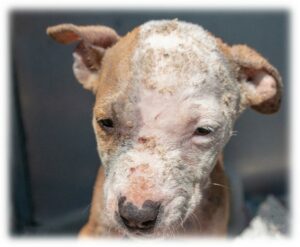What is Puppy Strangles? – Dr. Sophie Bell
Published: 17 April 2023
What is Puppy Strangles? - written by Dr. Sophie Bell
Puppy Strangles is fortunately an uncommon condition that usually affects dogs under the age of 6 months and is very rarely seen in adult dogs. The condition is also termed juvenile cellulitis, juvenile pyoderma, or sterile granulomatous dermatitis and lymphadenitis.
What causes it?
This condition is described as idiopathic which means it’s cause is unknown. However it is known that the puppies immune system is somewhat responsible for attacking its skin, so there is an immune mediated element to the condition. It is also believed to have a hereditary association as certain breeds including Golden Retrievers, Gordon Setters, and Dachshunds appear to be some of the more commonly breeds affected.
What will you see?
These puppies develop acute facial swelling, with raised bumps, and pustules which are small fluid filled blisters or lesions which may also be seen inside the ears. The skin is sore with oozing and crust evident. The condition causes the puppy to feel very unwell as a host of other symptoms accompany the swelling and skin sores develop.
Symptoms
Pyrexia – this is the term used for a fever when a dog’s temperature is 39.2°C or above. (Normal range: 37.5-39.2°C)
Anorexia – a reduced, or complete lack of appetite may be seen. Food is an important part of keeping an animal hydrated, puppies can therefore become dehydrated and weak.
Pain – causes the puppy to be listless or lethargic, disinterested in normal puppy play.
Neck swelling – this is due to swollen lymph nodes which can be tender and cause some pain on swallowing. The nodes can rupture and cause oozing from the skins surface.
Hair loss and scarring – due to the lesions as they scab, especially if deep.
Ear infections – these usually occur due to pustules inside the ears which can be full of bacteria leading to painful ear infections.
Limping – a less common symptom, but the condition can cause arthritic pain which will resolve with treatment.
Skin sores on the body itself if the condition is left untreated and spreads.
It is important to appreciate that puppy strangles is not contagious to other dogs, nor is it a zoonotic disease which means humans cannot catch it from dogs. However, if one puppy in the litter is affected, others may also become affected due to its hereditary element.
How is it diagnosed?

Both fungal infections and mange are far more common than puppy strangles so your vet will perform a skin scrape first. A scalpel blade is used to scrape down to the deeper layers of the skin and this is then examined under a microscope.
Your vet may use tape on the skin to pick up cells which are again analysed under the microscope.
A skin biopsy may also be performed to be sure of the diagnosis and is the best method for diagnosing puppy strangles.
It is important to be sure of the diagnosis before treating as inappropriate treatment could make the condition worse. Your vet may also take bloods as some of these puppies will be very poorly and require replacement of electrolytes, fluids, potentially supplementation of glucose, and intravenous antibiotics. So, bloods are needed to assess the puppy.
What is the treatment?
With its immune mediated cause, steroids usually prednisolone is the treatment if choice. They will be given at high doses and can cause unwanted side affects such as increased thirst, increased urination, increased panting, and a ravenous appetite.
The immune system of the puppy will be supressed so they can become prone to other infections. Often medication is given to protect the stomach whilst the puppy is receiving steroid treatment alongside antibiotics to tackle any secondary skin infections. It is important to note that steroids must never be stopped rapidly, always tapered off slowly, but your vet will advise you.
Topical shampoos and mousses can help soothe the skin, but you must discuss these with your vet first to ensure you are choosing one that will help and not potentially make the problem worse.
Affected puppies should never be used for breeding as there is a high risk they will pass this on to their offspring.
And the prognosis?
Although these puppies maybe left with permanent skin scarring and potentially hair loss, many do recover and do not relapse once tapered from the steroids. But treatment needs to be prompt. Pet owners should always be vigilant of any changes they may see with their dogs, and all new findings should be checked out by the vet.
